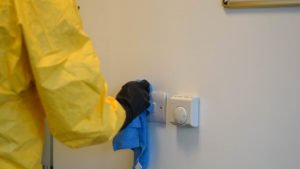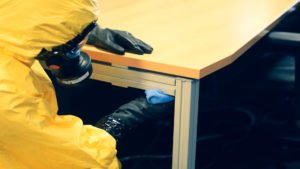In these unprecedented times, it’s more important than ever that businesses take the right measures to ensure their facilities are hygienic and that employees are safe. Those businesses that have temporarily closed and are starting to plan for when they can reopen, should think about what the workplace will look like post lockdown, and proactively take steps to ensure they reopen in the most hygienic way possible, according to Jamie Woodhall, Technical & Innovations Manager at Rentokil Specialist Hygiene.
Regular cleaning is essential
 With large numbers of people sharing space and equipment, workplaces can be places where infection spreads quickly. It is essential that those managing offices, construction sites, manufacturing plants and heavily populated workplaces make sure they doing everything they can to ensure their premises don’t serve as a hotbed for viral infection.
With large numbers of people sharing space and equipment, workplaces can be places where infection spreads quickly. It is essential that those managing offices, construction sites, manufacturing plants and heavily populated workplaces make sure they doing everything they can to ensure their premises don’t serve as a hotbed for viral infection.
Areas of the workplace with high footfall such as kitchens, dining areas and washrooms should be subject to vigilant daily and weekly cleaning routines. It might sound simple but encouraging proper handwashing, something that has been repeated constantly on the news in recent weeks, will also help to prevent the spread of germs. Hands are a natural breeding ground for germs and one of the principal carriers of harmful pathogens – in fact, 80% of infections are spread by hand. Ensuring employees have access to the essential handwashing tools – warm water, soap, drying facilities and ideally, hand sanitiser – goes a long way. There should be ample supply of these products in the washrooms, breakout and kitchen areas throughout the premises, paired with handwashing reminders to encourage best practice.
Proactive prevention
On top of a regular cleaning regime, businesses should look to carry out regular deep cleans of thier premesis. This may need to increase based on the nature of the business and its hours of operation. A deep clean should include a thorough disinfection of high frequency touch points, as well as moving all furniture or equipment away from the walls to make sure no areas are missed from the standard cleaning routine.
With regard to the coronavirus outbreak, businesses that remain in operation would be wise to review and update their cleaning regimes. They should also consider proactively preparing in case a deep clean is required, such as in the event they have a suspected or confirmed coronavirus diagnosis onsite. This would require a contingency survey of the premises, typically offered by experts to gather key information in advance including a site-specific risk assessment, to enable a quick response in the event of coronavirus being reported on the site at a later date.
Reacting quickly
 In addition to prevention, it’s also important that if a worker or visitor to your facility does contract, or is suspected to have contracted coronavirus, you react quickly to decontaminate the premises.
In addition to prevention, it’s also important that if a worker or visitor to your facility does contract, or is suspected to have contracted coronavirus, you react quickly to decontaminate the premises.
Under government guidance, in most circumstances the amount of infectious virus on any contaminated surface is likely to have significantly decreased after 72 hours. This is a key consideration to determine the type of specialist disinfection service that your premises will need.
For businesses with a confirmed or suspected case of coronavirus on the premises and where the site needs to be up and running quickly, a service manager can implement stringently risk assessed infection control measures that go beyond the minimum World Health Organization guidance.
Firstly, they survey the site wearing the appropriate personal protective equipment (PPE), and respiratory protective equipment (RPE). Then, guided by a site-specific risk assessment, method statement and safe operating procedures, Royal Society for Public Health qualified staff meticulously disinfect rooms and areas that pose a threat of causing cross contamination, using a high-level surface disinfectant on surfaces such as floors, walls, ceilings and any objects. ULV disinfection fogging, may also be used to allow for the treatment of large areas in a short space of time.
All waste generated as part of the disinfection process needs to be segregated onsite and then disposed of in a safe and legally compliant manner, in line with guidance set out by Public Health England, to help eliminate cross contamination.
Stories have been circulating in the media of suppliers overcharging and sub-standard products being touted as high-quality equipment. In this panel debate, PPE manufacturers and distributors will advise practitioners how they can avoid falling into these traps and what they should be wary of. The panel will also discuss some of the work they have been doing during the pandemic and how COVID-19 has affected the supply chain.
What makes us susceptible to burnout?
In this episode of the Safety & Health Podcast, ‘Burnout, stress and being human’, Heather Beach is joined by Stacy Thomson to discuss burnout, perfectionism and how to deal with burnout as an individual, as management and as an organisation.
We provide an insight on how to tackle burnout and why mental health is such a taboo subject, particularly in the workplace.

 With large numbers of people sharing space and equipment, workplaces can be places where infection spreads quickly. It is essential that those managing offices, construction sites, manufacturing plants and heavily populated workplaces make sure they doing everything they can to ensure their premises don’t serve as a hotbed for viral infection.
With large numbers of people sharing space and equipment, workplaces can be places where infection spreads quickly. It is essential that those managing offices, construction sites, manufacturing plants and heavily populated workplaces make sure they doing everything they can to ensure their premises don’t serve as a hotbed for viral infection. In addition to prevention, it’s also important that if a worker or visitor to your facility does contract, or is suspected to have contracted coronavirus, you react quickly to decontaminate the premises.
In addition to prevention, it’s also important that if a worker or visitor to your facility does contract, or is suspected to have contracted coronavirus, you react quickly to decontaminate the premises.
I would much prefer to see examples of how companies are dealing with these challenges on a day to day basis